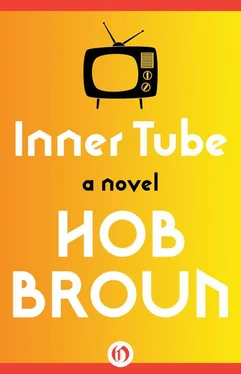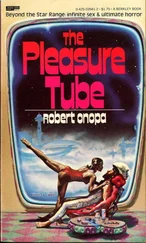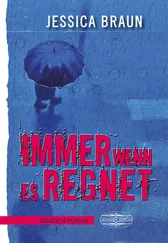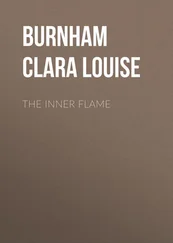AT FOUR THIS MORNING, a Violet intrusion. The receiver nestled conveniently into the pillow, and for the first minute or two her voice blended into my dream: On the He and She set, measuring Paula Prentiss for a flight harness, and Violet’s the script girl calling out sandwich orders. Some catch or quaver pulled me the rest of the way Out of sleep with the knowledge that my ex-wife was at the edge. Wouldn’t I come to her?
The immediate instinct was evasion. I was a wily lunker bass sheltered in thick weeds. The shiny lure ran past me again and again, and up from the darkness of my fish memory came Sunday afternoons fuzzed with Librium when Violet would invite me into her deepest bowels and I would feel the length of her spine under me like water-polished stones. But I stayed in the weeds.
“I’m here now. Can’t go back.”
It was a city of ten thousand gas stations, of countless possibilities, and I had been happy there. Why not go back?
Because one of us would in some way have to die, give up our ghost.
Violet always said: “I’m not ready to be casual about you.”
If only she were.
There could be no sleep after that call. I smoked and drank root beers and read the last book my anthropologist had sent, a mystery novel by an Indonesian diplomat. I thought about the banana tree under her bathroom window and the senescent cafeteria across the street.
By seven-thirty there was nothing left to do but head for the job. Out by the flagpole I saw Heidi and her mate, he, I supposed, on his way to dispense bed baths and muscle relaxants at Cherry Ames. They jostled and teased like a couple of study hall sweethearts and I watched from the car as long as I could stand. He knew the touch of her mouse teeth, the press of her bones, as well as I did; and the things that kept her up at night far better. If there was no going back for me, there was no going forward, either. I kept my eyes on the gas gauge as I drove past them.
So now I’m pumping up and down in the tube, looking to relax. It’s a voice-activated elevator and by calling out numbers like an auctioneer, you can paralyze its soldered brain so it wont go anywhere. The stainless-steel wall is cool against my back, the softly buzzing alarm quite pleasant.
An overriding mechanical voice on the intercom: “Clearing command block. Clearing command block.”
So much for relaxation. I step off at LIB CNTRL equipped with a requisition bearing the supervisory signature (forged) which the new procedure guidelines call for. What I’m looking for is the G.E. College Bowl segment on which U.C., Santa Clara — and Violet — appeared. The clerk is a pouty little gum-cracker I’ve never seen before; and if she’s going to wear sunglasses and wing-nut earrings, I probably won’t see again. She sighs heavily and the characters crawling across the display terminal reverse themselves in her green lenses.
Behind her, the stacks curve massively like ranked waves. One of the top-tier caliphs was touring through here a few years ago and noted brown patches marring the symmetry, even a stripe of white here and there. His decree appeared the following day: All cassette casings, without exception, shall be black.
This great accumulation has a majesty that never fades for me. I’m as engorged as a miser in a room full of gold, with a sense of completion, of value captured. And always I am wrapped in images of the monastery. There is no self-denial in this life. I am a voluptuary overflowing with time, a lotus-eater in my vault of books. In gold leaf and lapis blue, I illuminate the work of Dalmatian poets. I annotate to exhaustion the long-suppressed memoirs of Scrooge McDuck. And in the mornings, after porridge, I walk windy parapets overlooking a landscape empty of men.
Here it is then: Program #121, 4/17/65, B/W, Synchro-track. I am anxious to see Violet at twenty, deadly serious, as she claims to have been, and still unplucked — though I can’t imagine her innocence being any more than a technicality. I would have been just fifteen in April of ’65, a weedy snot caught in the embracing tentacles of bogus sophistication and no doubt as unattractive to an ambitious fruit heiress like Violet (her self-portrait) as I was to everyone else. We might have done well to have gotten it over with right then and there.
I’m secured in my cell and about to begin the investigation when quashed. Delvino invades my ear with his hearty hellos. Yeah, he takes a personal interest. In espionage cant, he would be called my “operator.” No way to pull a cordless phone out of the wall. Clever, clever.
“We always have something to discuss, am I right?”
There are the usual ambiguities to comb through, certain code phrases to exchange. We’re attuned, like an old married couple, so it’s no strain to pick out the undertones of threat he’s feeling. There might even be someone standing over him and making notes.
I improvise. “We should have dinner sometime soon. There’s a good Greek place in town. You know, a neutral site.”
He reacts as if I’ve asked him to spend the night.
“No, no…I don’t think, well…Really, uh, not wise.”
And to think I’m here because I wanted to escape California by winning fifty thousand dollars on a quiz show.
“I’m sorry. Five-point penalty, and I’ll repeat the entire question for Ohio Wesleyan. British novelist Thomas Hardy was the author of a series of novels set in the mythical county of Wessex….”
Violet’s round, cream-puff face has tightened with — what is it? Fear? Shame? This is her third incorrect, and premature, answer in a row. Her “team” is falling far behind.
“Santa Clara, Feilinghaus.”
“Would that be Henry the Fourth?” Her voice sails into a harsh upper register.
“No, I’m sorry…”
It could be my imagination, but Violet’s prim sweater seems to have darkened with flop sweat. Her hair, though heavily sprayed, has begun to undo itself in response to some magnetic field of humiliation.
Consider the divergences possible inside the same family. A week or so after our return from Las Vegas, Violet’s mother and young sisters came from Redlands for a celebratory weekend of shopping and dining out. A surprise weekend. I’d spent most of that Friday pollinating orchids with my friend Marsh, returned, and found strangers at home. They introduced themselves: Rose and Jonquil. I received new-brother-in-law kisses from two girls who were totally, and quite casually, naked.
“We’re cleaning your apartment as a wedding present and we don’t want to get our clothes dirty,” Rose said, brushing cigarette ash off her breasts.
Smiling, Jonquil returned to her vacuuming. Had to get the job done before Sis and Mom got back from Magnin’s.
Compare this nonchalance with the urgent insecurities of Violet, a woman who could negotiate Santa Monica Boulevard at 50 mph, but needed half a bottle of Chablis to nerve herself for a freshman lecture and bowed to the opinions of boutique salesgirls.
I freeze the image. Her circled lips nearly touching the microphone, Violet bends far forward, as though shrinking from a whip. The eyes of the bow-tied classmate on her left are caught in mid-roll; he anticipates another blunder. Had they warned her during the brownie mix commercial to keep her mouth shut?
“Mr. Earl, the work is Growing Up in Samoa and the author is Margaret Mead.”
“That is correct. All right, once again, Santa Clara, the subject is astronomy and your question is in three parts….”
Consider the artificial logic of one thing we name “destiny.” My ex-wife recalls her fascination with the migrants who came to harvest the family orchards and supposes it led her to her current work. My friend and coworker has told me of the secret attentions paid her by a favorite aunt and how they were crucial to her emergence as a lover of women. But I doubt they believe in this sort of continuity any more than I do.
Читать дальше












